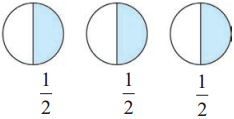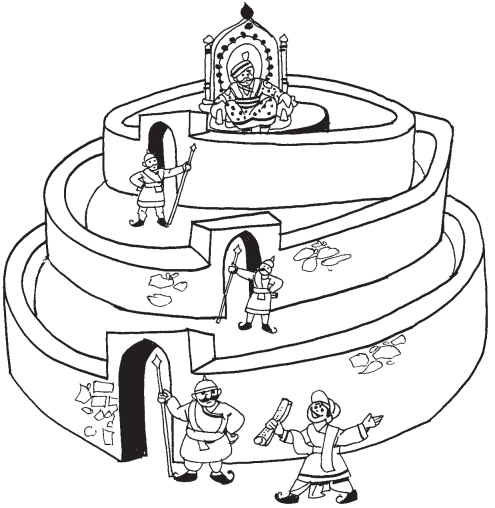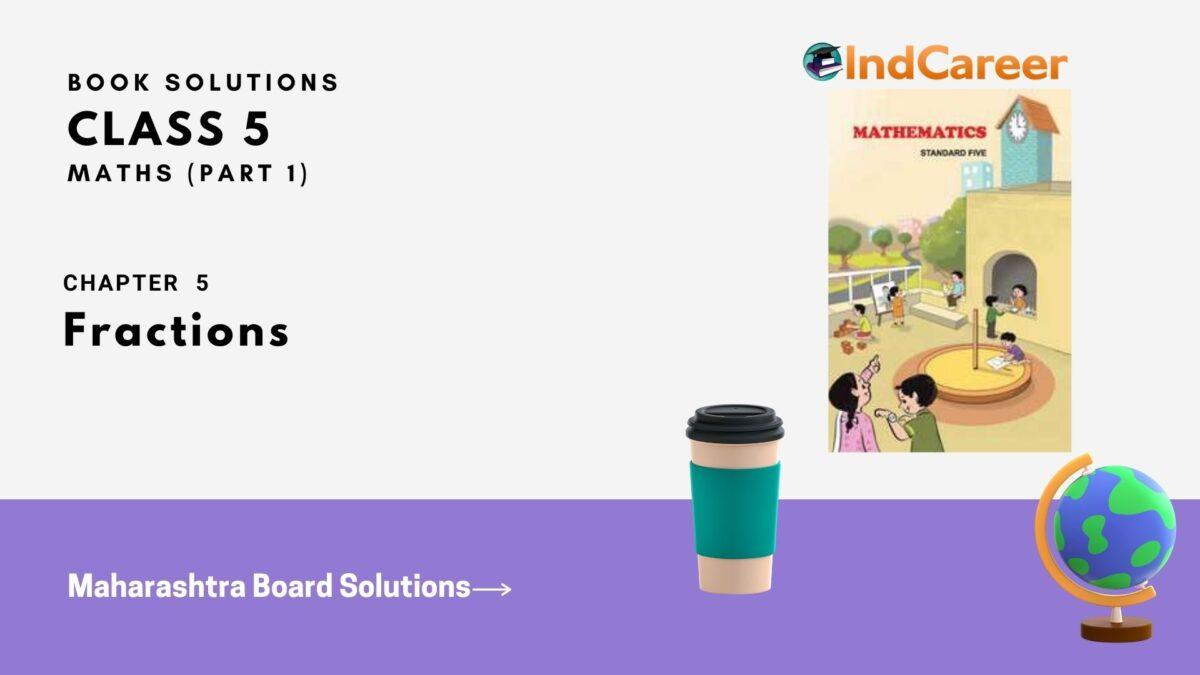Maharashtra Board Solutions Class 5-Maths (Problem Set 23) – Part 1: Chapter 5- Fractions
Contents
Maharashtra Board Solutions Class 5-Maths (Problem Set 23) – Part 1: Chapter 5- Fractions
Maharashtra Board 5th Maths Chapter 5, Class 5 Maths Chapter 5 solutions
Important Questions and Answers.
Question 1.
What is 13 of each of the collections given below?
(1) 15 pencils
(2) 21 balloons
(3) 9 children
(4) 18 books
Answer:
(1) 15 pencils → 13 of 15 = 5, 15 ÷ 3 = 5 pencils.
(2) 21 baloons → 13 of 21 = 7,21 ÷ 3 = 7 baloons.
(3) 9 children → 13 of 9 = 3, 9 ÷ 3 = 3 chi1dren.
(4) 18 books → 13 of 18 = 6, 18 ÷ 3 = 6 books.
Question 2.
What is 15 of each of the following?
(1) 20 rupees
(2) 30 km
(3) 15 litres
(4) 25 cm
Answer:
(1) 20 rupees → 15 of 20 = 4, 20 ÷ 5 = 4 rupees.
(2) 30 km → 15 of 30 = 6, 30 ÷ 5 = 6km.
(3) 15 litres → 15 of 15 = 3, 15 ÷ 5 = 3 litres.
(4) 25 cm → 15 of 25 = 5, 25 ÷ 5 = 5cm.
Question 3.
Find the part of each of the following numbers equal to the given fraction.
(1) 23 of 30
Solution:
23 x 30 So, we take 13 of 30, twice
13 x 30 = 10, twice of 10 is 2 x 10 = 20
It means that 23 x 30 = 20
(2) 711 of 22
Solution:
711 x 22 So, we take of 22, 7 times
111 x 22 = 2, seven times of 2 is 2 x 7 = 14
(3) 38 of 64
Solution:
38 x 64 So, we take 18 of 64, thrice
18 x 64 = 8, 3 times 8 is 3 x 8 = 24
(4) 513 of 65
Solution:
513 x 65 So, we take 113 of 65, 5 times
113 x 65 = 55 times of 5 is 5 x 5 = 25
Mixed fractions

Half of each of the three circles is coloured. That is, 3 parts, each equal to 12 of the circle, are coloured.
The coloured part is 12 + 12 + 12, that is, 32 or 1 + 12.
1 + 12 is written as 1 12. 1 12 is read as ‘one and one upon two’.
In the fraction 1 12, 1 is the integer part and 12 is the fraction part. Hence, such fractions are called mixed fractions or mixed numbers. 2 14, 3 25, 7 49 are all mixed fractions.
Fractions in which the numerator is greater than the denominator are called improper fractions.
32, 53 are improper fractions. We can convert improper fractions into mixed fractions.
For example, ![]()
Activities
1. Colour the Hats.
In the picture alongside :
Colour 13 of the hats red.
Colour 35 of the hats blue.
How many hats have you coloured red?
How many hats have you coloured blue?
How many are still not coloured?
2. Make a Magic Spinner.

Take a white cardboard disc. As shown in the figure, divide it into six equal parts.
Colour the parts red, orange, yellow, green, blue and violet.
Make a small hole at the centre of the disc and fix a pointed stick in the hole.
Your magic spinner is ready.
What fraction of the disc is each of the coloured parts?
Give the disc a strong tug to make it turn fast. What colour does it appear to be now?
The Clever Poet

There was a king who had a great love for literature. A certain poet knew that if the king read a good poem it made him very happy. Then the king would give the poet an award. Once, the poet composed a good poem. He thought if he showed it to the king, he would win a prize. So, he went to the king’s palace. But, it was not easy to meet the king. You had to pass a number of gates and guards. The first guard asked the poet why he wanted to meet the king. So, the poet told him the reason. Seeing the chance of getting a share of the award, the guard demanded, ‘You must
give me 110 of your prize. Only then will I let you go in.’ The poet could do nothing but agree. The second guard stopped him and said, ‘I will let you go in only if you promise me 25 of your prize.’ The third guard, too, was a greedy man. He said, ‘I will not let you go, unless you promise me 14 of your prize.’ The king’s palace was just a little distance away. Now, the poet told the guard, ‘Why only 14, I shall give you half the prize!’ The guard was pleased and let him in.
The king liked the poem. He asked the poet, ‘What is the prize you want?’ ‘I shall be happy if Your Majesty awards me 100 lashes of the whip.’ The king was surprised. ‘Are you out of your mind!’ he exclaimed. ‘I have never met anyone so crazy as to ask for a whipping !’
‘Your Majesty, if you wish to know the reason, the three palace guards must be called here.’ When the guards came, the poet explained, ‘Your Majesty, all of them have a share in the 100 lashes that you have awarded to me. Each of them has fixed his own share of the prize I get. The first guard
must get 110 of the award, that is, [ ] lashes. The second must get 25, which is [ ], and the third must get half the award, that is, [ ] lashes !’ The king could now see how greedy the guards were and how clever the poet was. He saw to it that each guard got the punishment he deserved. He gave the poet a prize for his poem. He also gave him an extra 100 gold coins for exposing the greed of the guards.
What was the clever idea of the poet which the king appreciated so much?
Additional Important Questions and Answers
Question 1.
What is 13 of each of the collections given below?
(1) 24 marbles →
(2) 6 erasers →
Answer:
(1) 24 marbles → 13 of 24 = 8, 24 ÷ 3 = 8 marbles.
(1) 6 erasers → 13 of 6 = 2, 6 ÷ 3 = 2 erasers.
Question 2.
What is 15 of each of the following?
(1) 35 gm →
(2) 40m →
Answer:
(1) 35 gm → 15 of 35 = 7, 35 ÷ 5 = 7 gm.
(2) 40m → 15 of 40 = 8, 40 ÷ 5 = 8m.
Question 3.
Find the part of each of the following numbers equal to the given fraction:
(1) 79 of 45
Solution:
79 x 45 So, we take 19 of 45, 7 times
19 x 45 = 5, 7 times of 5 is 7 x 5 = 35
(2) 37 of 28
Solution:
37 x 28 So, we take 17 of 28, thrice
17 x 28 = 4, 3 times of 4 is 4 x 3 = 12
Question 4.
Find the proper number in the box:![]()
![]()






Answer:
(1) 3
(2) 36
(3) 3
(4) 7
(5) 8, 18
(6) 12, 6
(7) 9, 16, 20, 24
(8) 15, 20, 35, 36, 55
Question 5.
Find an equivalent fraction with denominator 3, for each of the following fractions.![]()
Answer:![]()
Question 6.
Find an equivalent fraction with numerator 30 for each of the following fractions.![]()
Answer:![]()
Question 7.
Find two equivalent fractions for each of the following fraction.
(1) 57
(2) 89
(3) 713
Answer:
(1) ![]()
(2) ![]()
(3) ![]()
Question 8.
Match the columns (A) and (B) for having equivalent fractions:
| (A) | (B) | |
| (1) | 34 | (a) 1527 |
| (2) | 59 | (b) 23 |
| (3) | 711 | (c) 2736 |
| (4) | 812 | (d) 2844 |
Answer:
(1) ↔ (c)
(2) ↔ (a)
(3) ↔ (d)
(4) ↔ (b)
Question 9.
Convert the given fractions into like fractions:
(1) 110,23
(2) 37,45
(3) 13,35
(3) 14,25
Answer:
(1) 330,2030
(2) 1535,2835
(3) 515,915
(3) 520,820
Question 10.
Write the proper symbol from <, > or = in the box:![]()
![]()
![]()
![]()
![]()
Answer:
(1) >
(2) >
(3) >
(4) >
(5) >
Question 11.
Add the following:
(1) 16+26
(2) 14+34
(3) 513+213+313
(4) 29+37
(5) 311+23
(6) 110+45
Answer:
(1) 36
(2) 44
(3) 1013
(4) 4163
(5) 3133
(6) 910
Question 12.
Subtract the following:
(1) 56−16
(2) 35−25
(3) 716−316−116
(4) 56−712
(5) 1316−58
(6) 49−310
Answer:
(1) 46
(2) 15
(3) 316
(4) 312
(5) 313
(6) 1390
Question 13.
What is 14 of each of the collections given below:
(1) 20 marbles
(2) 12 pens
(3) 24 notebooks
(4) 8 ladoos
Answer:
(1) 5 marbles
(2) 3 pens
(3) 6 notebooks
(4) 2 ladoos
Question 14.
What is 16 of each of the following:
(1) 18 bananas
(2) 12 gms
(3) 30 metres
(4) 24 ₹
Answer:
(1) 3 bananas
(2) 2 gms
(3) 5 metres
(4) 4 ₹
Question 15.
Find the part of each of the following numbers equal to the given fraction.
(1) 25 of 25
(2) 37 of 21
(3) 49 of 36
(4) 417 of 34
Answer:
(1) 10
(2) 9
(3) 16
(4) 8
Question 16.
Printed price of. the book was 80. Vikram purchased the book by paying of the printed price of the book. How much he paid for the book?
Answer:
64 ₹
Download PDF
Maharashtra Board Solutions Class 5-Maths (Problem Set 23) – Part 1: Chapter 5- Fractions
Chapterwise Maharashtra Board Solutions Class 5 Maths :
Part 1
- Chapter 1- Roman Numerals (Problem Set 1)
- Chapter 2- Number Work (Problem Set 2)
- Chapter 2- Number Work (Problem Set 3)
- Chapter 2- Number Work (Problem Set 4)
- Chapter 2- Number Work (Problem Set 5)
- Chapter 2- Number Work (Problem Set 6)
- Chapter 3- Addition and Subtraction (Problem Set 7)
- Chapter 3- Addition and Subtraction (Problem Set 8)
- Chapter 3- Addition and Subtraction (Problem Set 9)
- Chapter 3- Addition and Subtraction (Problem Set 10)
- Chapter 3- Addition and Subtraction (Problem Set 11)
- Chapter 3- Addition and Subtraction (Problem Set 12)
- Chapter 3- Addition and Subtraction (Problem Set 13)
- Chapter 4- Multiplication and Division (Problem Set 14)
- Chapter 4- Multiplication and Division (Problem Set 15)
- Chapter 4- Multiplication and Division (Problem Set 16)
- Chapter 5- Fractions (Problem Set 17)
- Chapter 5- Fractions (Problem Set 18)
- Chapter 5- Fractions (Problem Set 19)
- Chapter 5- Fractions (Problem Set 20)
- Chapter 5- Fractions (Problem Set 21)
- Chapter 5- Fractions (Problem Set 22)
- Chapter 5- Fractions (Problem Set 23)
- Chapter 6- Angles (Problem Set 24)
- Chapter 6- Angles (Problem Set 25)
- Chapter 6- Angles (Problem Set 26)
- Chapter 6- Angles (Problem Set 27)
- Chapter 7- Circles (Problem Set 28)
- Chapter 7- Circles (Problem Set 29)
- Chapter 7- Circles (Problem Set 30)
- Chapter 7- Circles (Problem Set 31)
Part 2.
- Chapter 8- Multiples and Factors (Problem Set 32)
- Chapter 8- Multiples and Factors (Problem Set 33)
- Chapter 8- Multiples and Factors (Problem Set 34)
- Chapter 8- Multiples and Factors (Problem Set 35)
- Chapter 9- Decimal Fractions (Problem Set 36)
- Chapter 9- Decimal Fractions (Problem Set 37)
- Chapter 9- Decimal Fractions (Problem Set 38)
- Chapter 9- Decimal Fractions (Problem Set 39)
- Chapter 9- Decimal Fractions (Problem Set 40)
- Chapter 9- Decimal Fractions (Problem Set 41)
- Chapter 9- Decimal Fractions (Problem Set 42)
- Chapter 10- Measuring Time (Problem Set 43)
- Chapter 10- Measuring Time (Problem Set 44)
- Chapter 10- Measuring Time (Problem Set 45)
- Chapter 11- Problems on Measurement (Problem Set 46)
- Chapter 11- Problems on Measurement (Problem Set 47)
- Chapter 12- Perimeter and Area (Problem Set 48)
- Chapter 12- Perimeter and Area (Problem Set 49)
- Chapter 12- Perimeter and Area (Problem Set 50)
- Chapter 13- Three Dimensional Objects and Nets (Problem Set 51)
- Chapter 14- Pictographs (Problem Set 52)
- Chapter 15- Patterns (Problem Set 53)
- Chapter 16- Preparation for Algebra (Problem Set 54)
- Chapter 16- Preparation for Algebra (Problem Set 55)
- Chapter 16- Preparation for Algebra (Problem Set 56)
FAQs
You can download the Maharashtra State Board Books from the eBalbharti official website, i.e. cart.ebalbharati.in or from this article.
Students can get the Maharashtra Books for primary, secondary, and senior secondary classes from here. You can view or download the Maharashtra State Board Books from this page or from the official website for free of cost. Students can follow the detailed steps below to visit the official website and download the e-books for all subjects or a specific subject in different mediums.
Step 1: Visit the official website ebalbharati.in
Step 2: On the top of the screen, select “Download PDF textbooks”
Step 3: From the “Classes” section, select your class.
Step 4: From “Medium”, select the medium suitable to you.
Step 5: All Maharashtra board books for your class will now be displayed on the right side.
Step 6: Click on the “Download” option to download the PDF book.
As of now, the MSCERT and Balbharti are responsible for the syllabus and textbooks of Classes 1 to 8, while Classes 9 and 10 are under the Maharashtra State Board of Secondary and Higher Secondary Education (MSBSHSE).
The Maharashtra State Board of Secondary & Higher Secondary Education, conducts the HSC and SSC Examinations in the state of Maharashtra through its nine Divisional Boards located at Pune, Mumbai, Aurangabad, Nasik, Kolhapur, Amravati, Latur, Nagpur and Ratnagiri.
About Maharashtra State Board (MSBSHSE)
The Maharashtra State Board of Secondary and Higher Secondary Education or MSBSHSE (Marathi: महाराष्ट्र राज्य माध्यमिक आणि उच्च माध्यमिक शिक्षण मंडळ), is an autonomous and statutory body established in 1965. The board was amended in the year 1977 under the provisions of the Maharashtra Act No. 41 of 1965.
The Maharashtra State Board of Secondary & Higher Secondary Education (MSBSHSE), Pune is an independent body of the Maharashtra Government. There are more than 1.4 million students that appear in the examination every year. The Maha State Board conducts the board examination twice a year. This board conducts the examination for SSC and HSC.
The Maharashtra government established the Maharashtra State Bureau of Textbook Production and Curriculum Research, also commonly referred to as Ebalbharati, in 1967 to take up the responsibility of providing quality textbooks to students from all classes studying under the Maharashtra State Board. MSBHSE prepares and updates the curriculum to provide holistic development for students. It is designed to tackle the difficulty in understanding the concepts with simple language with simple illustrations. Every year around 10 lakh students are enrolled in schools that are affiliated with the Maharashtra State Board.
